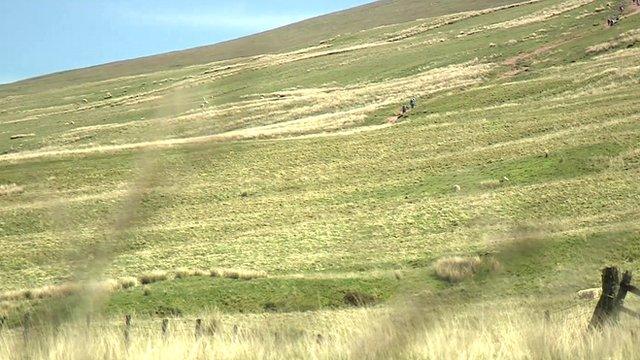SAS selection deaths: Coroner delivers neglect conclusion
- Published
The coroner listed ''gross failings'' in the exercise involving the three men, as Jonathan Beale reports
Three reservists who died on an SAS selection march would have survived if the hike had been stopped when other soldiers fell ill, a coroner has said.
Coroner Louise Hunt ruled L/Cpl Edward Maher, L/Cpl Craig Roberts and Cpl James Dunsby died as a result of neglect on the 16-mile march.
All three suffered the effects of hyperthermia. The Brecon Beacons march was held on one of 2013's hottest days.
Ms Hunt said a failure of basic medical care contributed to their deaths.
The inquest in Solihull, West Midlands, had heard that had organisers strictly followed the Ministry of Defence's (MoD) code of practice, the march would have been cancelled after two men - not among those who died - were withdrawn from the exercise shortly after midday due to heat sickness.
Controversially, Army personnel had told the coroner they were not aware of the contents of the MoD guidelines and had been told not to bother reading them.
The Army said it accepted it did not carefully manage the risks involved in the exercise.
All three men were on course to complete the march within the allocated time but were found in three separate locations at different times.
Cpl James Dunsby's widow Bryher called for the Army to learn from 'countless and embarrassing' failings
The hearing had heard Cpl Dunsby, 31, of Bath, would have been suffering signs of heat illness when he passed the penultimate check point but staff missed it.
He was found collapsed near the finish, and died in hospital two weeks later.
Delivering her conclusion on Tuesday, the coroner said: "Those running this march were fundamentally under-briefed. They did not fully understand the risk of heat illness, and the emergency plan was inadequate.
"I consider the briefing to those running the march to be inadequate as it failed to include weather conditions, the risk of heat injury and the reporting of reasons for medical withdrawals should they occur.
"It also failed to include plans to evacuate any casualties," she said.
Ms Hunt said the medical plan for the July 2013 march had not been good enough, water supplies had been insufficient and the risk assessment had not identified the correct hospital for treatment.
A lack of water contributed to 31-year-old L/Cpl Maher's death, the hearing was told.
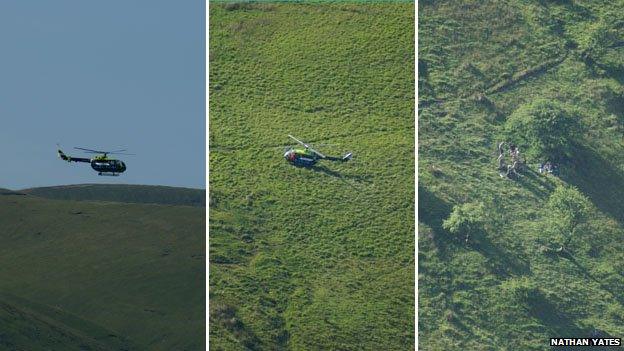
Nathan Yates, a walker from Cardiff, witnessed rescue attempts on one of the three men who died
There should have been closer liaison with emergency services to avoid multiple 999 calls and signal problems meant calls were cut off, leading to delays in getting to casualties, Ms Hunt said.
The coroner said there was a lack of understanding by the march's directing staff of soldiers withdrawing with heat illness and some staff were unaware some were ill.
She said that had the MoD's own guidance on heat illness been followed, the march would have been called off by 12:40 BST - more than four hours before the first victim, Cpl Roberts, 24, was found convulsing on the mountain.
Brigadier John Donnelly said the Army accepted it did not carefully manage the risks involved in the exercise
GPS trackers used to monitor candidates were not fit for purpose - something the MoD had known since 2009, the hearing was told.
"No measures were put in place in this march to mitigate that risk. This is concerning because it appears lessons have not been learned," Ms Hunt said.
She added there was a lack of understanding of an "individual's will to succeed" and there was "complacent" attitude to risk.
The failure to recognise the three men had stopped moving via the GPS tracker was a gross failure, which amounted to neglect, she said.
"In the case of each soldier there was a failure to provide basic medical care which contributed to their deaths."
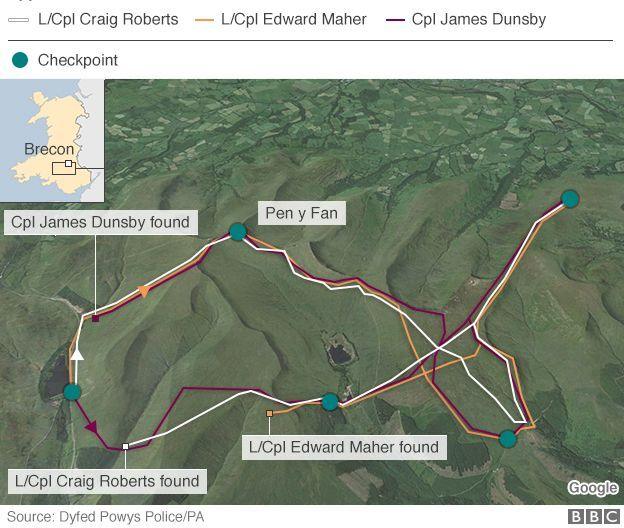
The soldiers collapsed during the march while carrying 50lbs (22kg) of equipment
The test was the second time L/Cpl Roberts, from Penrhyn Bay, Conwy, and L/Cpl Maher, of Winchester, had attempted SAS selection.
In a statement after the hearing, the family of L/Cpl Maher paid tribute to the "humanity and skill" of the police and SAS family liaison officers who supported them through the "most difficult two years of our lives".
They said while they supported the work of the special forces to produce "magnificent soldiers", training methods "must be fit for purpose" with differences between training and operational activities.
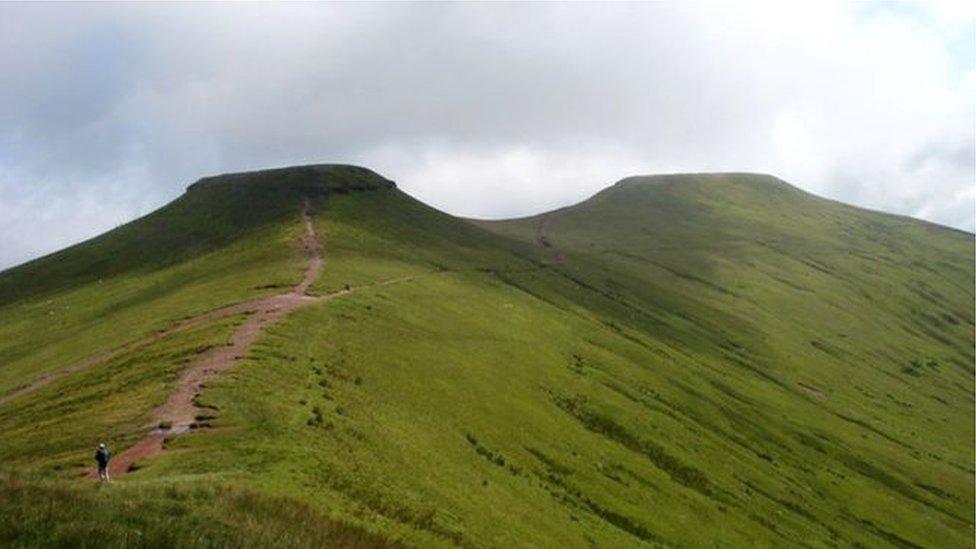
The Brecon Beacons, in Powys, has been used by the military since Roman times
"Our son was not on active service in July 2013; he was undergoing selection training on a Welsh hillside, and it is unacceptable that he paid for that training with his life," the statement added.
Cpl Dunsby's widow, Bryher Dunsby, said at times during the inquest the MoD had displayed "no responsibility, no accountability and no humility" in acknowledging the "vast catalogue of errors which were so clearly made".
"No part of the armed forces can be beyond scrutiny or above the law but unless and until those at the top acknowledge and accept responsibility for the failing of their organisations cultures will not change and mistakes will be repeated," she added.
Brigadier John Donnelly, the Army's director of personal services, apologised for the deaths of "three fine soldiers" and said the Army would make sure everything possible was done to prevent it happening again.
"It is necessary to train our soldiers to the highest standards to meet the security challenges that we face both in this country and overseas. To do this requires our individuals to push themselves and take some risk," he said.
"However, we must ensure that those risks are carefully managed. In this case, we did not do this and accept responsibility."
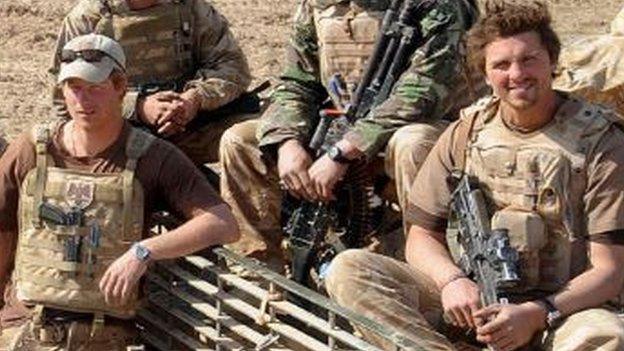
Prince Harry with James Dunsby and troops in Afghanistan
After the hearing, Health and Safety Executive said its investigation into the circumstances surrounding the reservists' deaths was continuing.

Hyperthermia
Heat exhaustion and heatstroke (referred to by the coroner as hyperthermia) are two potentially serious conditions that can occur if you get too hot.
They usually happens during a heatwave or in a hot climate, but can also occur when doing very strenuous physical exercise.
Heat exhaustion is where you become very hot and start to lose water or salt from your body, which leads to generally feeling unwell
Heatstroke is where the body is no longer able to cool itself and a person's body temperature becomes dangerously high
Heatstroke is less common than heat exhaustion, but more serious. It can put a strain on the brain, heart, lungs, liver and kidneys, and can be life-threatening
Source: NHS Choices website

Week In Week Out: Beyond the Call of Duty, BBC One Wales, 22:35 BST, Tuesday 14 July 2015
- Published14 July 2015

- Published25 June 2015
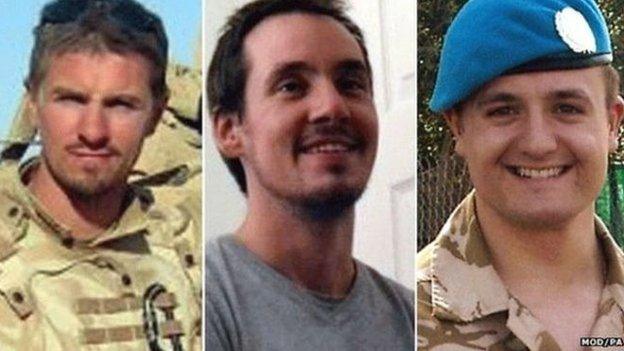
- Published24 June 2015

- Published22 June 2015
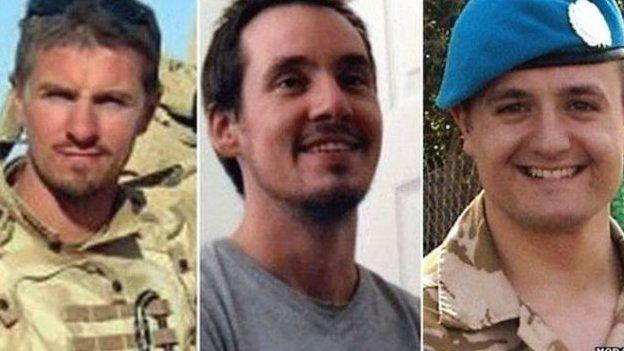
- Published11 June 2015
